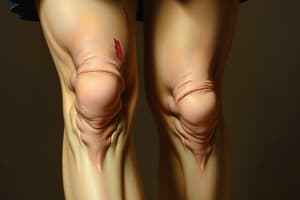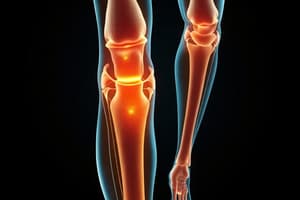Podcast
Questions and Answers
What is a primary cause of hypercalcemia in primary hyperparathyroidism?
What is a primary cause of hypercalcemia in primary hyperparathyroidism?
- Bone formation due to aging
- Decreased secretion of calcitonin
- Increased osteoblastic activity
- Increased secretion of parathyroid hormone (correct)
Which treatment is indicated for renal rickets?
Which treatment is indicated for renal rickets?
- Simply increasing sun exposure
- Surgical correction with osteotomies
- High doses of estrogen
- Active vitamin D and calcium (correct)
Which of the following is NOT a common site affected by osteoporosis?
Which of the following is NOT a common site affected by osteoporosis?
- Proximal humerus
- Distal radius
- Vertebral column
- Cervical spine (correct)
What is a recommended dietary component for the management of osteoporosis?
What is a recommended dietary component for the management of osteoporosis?
Which medication class is known to inhibit osteoclastic activity in osteoporosis treatment?
Which medication class is known to inhibit osteoclastic activity in osteoporosis treatment?
What is the primary cause of genu varum in infants?
What is the primary cause of genu varum in infants?
What angle indicates genu varum in terms of the anatomic tibiofemoral angle (aTFA)?
What angle indicates genu varum in terms of the anatomic tibiofemoral angle (aTFA)?
In children aged 1.5-2 years, what is the most common cause of genu varum?
In children aged 1.5-2 years, what is the most common cause of genu varum?
Which condition is characterized by knees that angle inward and touch when standing?
Which condition is characterized by knees that angle inward and touch when standing?
What anatomical alignment describes a normal knee while standing?
What anatomical alignment describes a normal knee while standing?
What is a common cause for genu varum in adults?
What is a common cause for genu varum in adults?
Which surgical procedure might be necessary for advanced congenital genu varum in children?
Which surgical procedure might be necessary for advanced congenital genu varum in children?
When evaluating knock knees, how does the mechanical axis relate to the knee joint?
When evaluating knock knees, how does the mechanical axis relate to the knee joint?
What is the common outcome for a child with Genu Valgum who is under the age of 4?
What is the common outcome for a child with Genu Valgum who is under the age of 4?
What is the normal neck-shaft angle of the proximal femur in adults?
What is the normal neck-shaft angle of the proximal femur in adults?
Which condition is characterized by an angle greater than 130°?
Which condition is characterized by an angle greater than 130°?
How can coxa vara and coxa valga affect an individual?
How can coxa vara and coxa valga affect an individual?
What defines the carrying angle of the elbow?
What defines the carrying angle of the elbow?
What is the consequence of having a cubitus varus angle?
What is the consequence of having a cubitus varus angle?
Which of the following is NOT a cause of bone softening diseases?
Which of the following is NOT a cause of bone softening diseases?
What is a key characteristic of osteogenesis imperfecta?
What is a key characteristic of osteogenesis imperfecta?
Which disease is characterized by defective mineralization of osteoid?
Which disease is characterized by defective mineralization of osteoid?
Which type of osteogenesis imperfecta is characterized by being stillborn or having multiple fractures at birth?
Which type of osteogenesis imperfecta is characterized by being stillborn or having multiple fractures at birth?
What is primarily responsible for the development of infantile rickets?
What is primarily responsible for the development of infantile rickets?
Which of the following is a typical bony manifestation of rickets?
Which of the following is a typical bony manifestation of rickets?
In rickets, the x-ray shows which of the following findings?
In rickets, the x-ray shows which of the following findings?
Which sign is characteristic of infantile rickets?
Which sign is characteristic of infantile rickets?
Which condition results from defective absorption of fat and vitamin D due to hereditary gluten intolerance?
Which condition results from defective absorption of fat and vitamin D due to hereditary gluten intolerance?
What is the main goal of orthopedic management in osteogenesis imperfecta?
What is the main goal of orthopedic management in osteogenesis imperfecta?
Flashcards are hidden until you start studying
Study Notes
Common Orthopaedic Deformities
- Deformities can be congenital or acquired.
- Most deformities may need surgical correction.
The Knee
- Genu Varum (Bow Leg):
- Infants: Most common cause is developmental and usually corrects by age 4.
- Children (1.5-2 years): Commonest cause is rickets, treated by correcting vitamin D deficiency.
- Adults: Osteoarthritis, mal-united fracture, ligamentous injury, Paget's disease are major causes. Treatment focuses on surgically correcting the deformity.
- Genu Valgum (Knock knees):
- Up to age 4: Usually developmental or physiological and resolves by age 6-8.
- Progressive: Supracondylar osteotomy of the femur may be required.
The Hip
- Normal neck-shaft angle of the proximal femur is 160° at birth decreasing to 125° in adulthood.
- Coxa Vara: Angle less than 110°. Leg is shortened with a limp. Can be congenital or caused by injury.
- Coxa Valga: Angle greater than 130°. Both deformities can lead to gait disability and secondary spinal pain. Treatment involves corrective subtrochanteric osteotomy.
The Elbow
- Carrying angle: Angle between the long axis of the extended forearm and the long axis of the arm.
- Normal carrying angle is 10 - 15 degrees of valgus.
- Cubitus Varus: Angle below 10 degrees.
- Cubitus Valgus: Angle above 15 degrees.
- Treatment: Wedge osteotomy at the lower humerus.
Bone Softening Diseases
- Bone cells form and remodel bone.
- Bone softening diseases can be caused by:
- Defective osteoid formation (osteogenesis imperfecta)
- Defective mineralization of osteoid (Rickets)
- Increased bone resorption (hyperparathyroidism)
- Decreased bone formation (osteoporosis)
Osteogenesis Imperfecta
- Generalized mesenchymal disorder with defective osteoid and collagen production leading to:
- Fragile bone with multiple fractures.
- Hyperlaxity of joints and blue sclera.
- Types:
- Congenital: Stillbirth or multiple fractures at birth.
- Infantile: Develops early in infancy with multiple fractures.
- Tarda: Manifestations occur in late childhood.
- Treatment is focused on preventing fractures and deformities, treating current fractures, and surgical correction of deformities.
Rickets
- Inadequate calcification of bone matrix during growth.
- Causes:
- Infantile: Vitamin D deficiency and lack of sunlight.
- Coeliac: Deficient absorption of fat and vitamin D due to gluten intolerance.
- Renal: Disturbed calcium-phosphorous metabolism caused by renal dysfunction.
- Clinical picture:
- Bony deformities: Bow legs (genu varum) or knock knees (genu valgum).
- Characteristic signs: Boxy-bossy skull, rickets rosary, pigeon chest, Harrison sulcus, broad metaphysis, Marfan sign.
- X-ray: Bone rarefaction, broadened and cupped metaphyses with brush border.
- Treatment:
- Infantile: Diet rich in calcium, phosphorus, and vitamin D. Sunlight exposure. Vitamin D and calcium supplements.
- Renal: High doses of active vitamin D (1-alpha) and calcium.
- Severe deformities: Osteotomies.
Hyperparathyroidism
- Increased secretion of parathyroid hormone.
- Causes increased bone resorption leading to:
- Hypercalcemia.
- Recurrent renal calculi.
- Cystic changes in bones, deformities, and pathological fractures.
- Treatment: Excision of parathyroid adenoma.
Osteoporosis
- Diminished bone mass due to decreased bone formation.
- Common sites affected:
- Vertebral column: Weakens vertebrae causing vertebral collapse, back pain, kyphosis, collapsed wedged or biconcave vertebra on X-ray.
- Proximal femur, proximal humerus, distal radius: Causes fractures after minor trauma.
- Diagnosis via bone densitometry (DEXA).
Osteoporosis Treatment
- Diet rich in calcium, vitamin D, and protein.
- Daily exercise and sunlight exposure.
- Medications:
- Calcium and vitamin D supplements.
- Calcitonin: Increases osteoblastic activity.
- Bisphosphonates: Inhibit osteoclastic activity.
- Hormonal Replacement Therapy (HRT) in some cases.
Studying That Suits You
Use AI to generate personalized quizzes and flashcards to suit your learning preferences.




